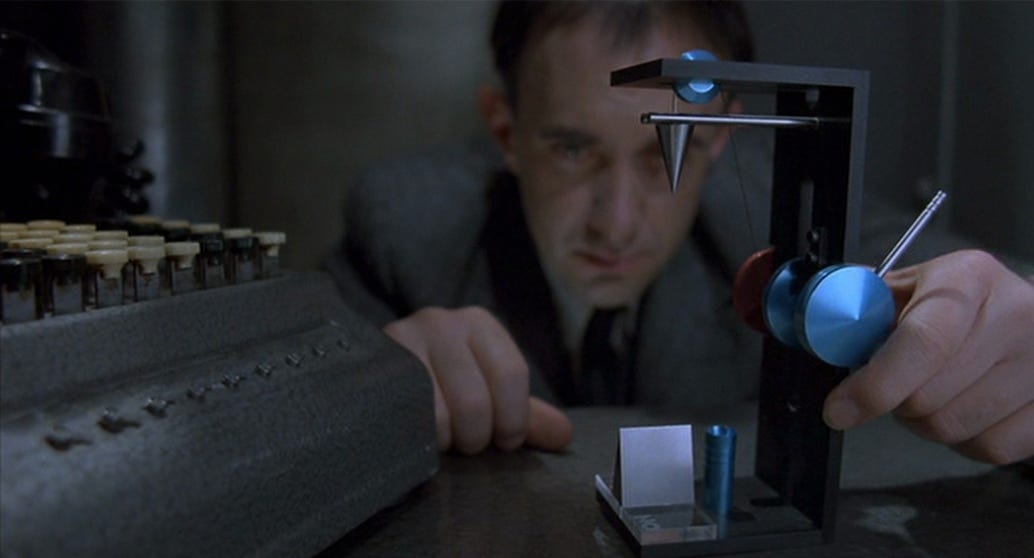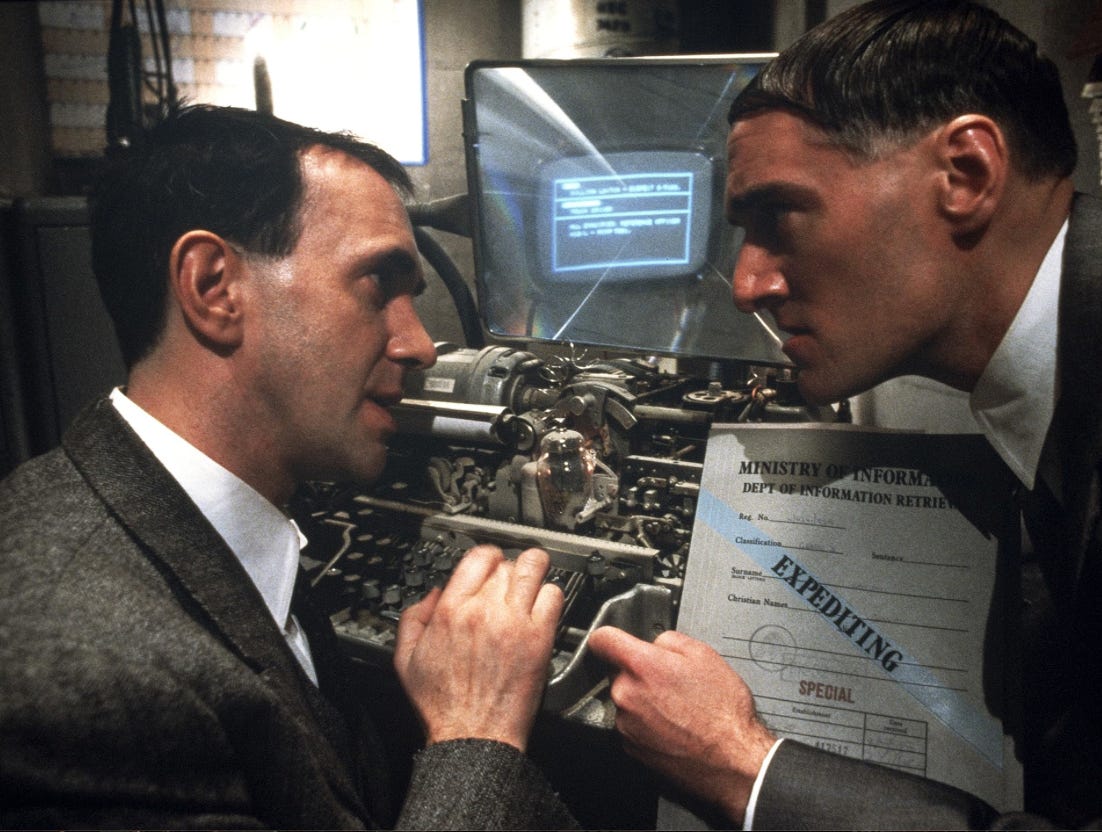Totally Under Control
Art of the Con Part 2: How two captains of grift, bluster, and megalomania are rewiring the government to really deliver.
I realize that journalism’s word of the era is “unprecedented,” but isn’t anyone else feeling some Trump 1.0 deja vu right about now? Wasn’t it this time in the first term that the chief problem facing the new president was the number of senior staffers overheard calling him an “idiot,” “dope,” or “moron”?
Isn’t 2.0’s main upgrade the full suite of human bots that are drawing this kind of fire upon themselves — a savvy distribution of incompetence and alcoholic rage that lets the real boss handle business?
Though I am a magazine journalist, I haven’t been on any PC small group chats lately, so my insights into our federal government come from months of following other experts on the subject and my assumption — shared in a previous post — that this regime is best understood as a scam.
This one has two principal actors, the confidence man working the mark (us) and the inside man running the operation. Rather than Newman and Redford in The Sting, these two are less allies than symbiotes, aligned only in the sense that a cop is aligned with the crook bribing him. True, the alliance has world-historic implications, but it’s still stark, obvious, and vulgar enough to confound most of the reasoned analysis out there.
In fact, you really have to feel for the experts obliged to discuss what we’re seeing in other terms, to engage with, say, the imposition of massive tariffs on allies as if they actually were intended to improve the US economy.
Here, I’m thinking of people like UCLA economy professor Kimberly Clausing, discussing Trump’s trade war with NYT’s Ezra Klein. Speaking in the respectful, well-modulated voice of an academic professional, she begins to go through the various ironies, paradoxes, and, er, counter-intuitive aspects of such a plan — which will force manufacturing overseas, make American-made goods much more expensive, and probably end the American auto industry — before throwing up her hands:
“I think it’s a…you know, [exhalation]. It’s hard to just use words like ‘dumb,’ but this does feel like a... Deeply misguided approach.”
Or is it — aha!— deeply misguided like a fox?
No. The idea of nation like the US putting tariffs on steel and aluminum is what economists call a stupid idea. The only stupider one being to institute these tariffs, then rescind them, then re-institute them, then rescind certain ones, leaving investors with no idea how to plan for even the immediate future. But this ignores their actual role.
Once you recognize tariffs as a way for a realty hustler/reality-TV star to install old-school corruption into the system, it tracks.
If someone’s priorities are revenge, money, and leisure time, patronage kills all three of these birds with one economy-crippling stone. Leaders seeking a lower tariff for their countries must come to the don bearing gifts. Congress reps seeking medical care for their constituents must appeal to the don personnally. The only mystery is why so little effort went into concealing it, but then again, see: incompetence.
2.0’s second most obvious upgrade is the other principal actor in this scam. I’m still not clear on why we’re pretending that “efficiency” is anything other than a handy e-word for shoehorning Elon Musk’s idea of a joke into the name of a federal agency. But here again, deja vu is unavoidable, since DOGE, although the better designed of two coterminous scams, is one long con that was already executed on a complex institution. That’s because this era’s Elon Musk is not the world-bestriding captain of industry his branding would have him be, but what the comedian Bill Burr calls him: “the Twitter guy.”
The tricky part is remembering, amid the buffoonery and zone-flooding shit, how the Twitter guy thinks and acts. Much of which, lucky for us, is deeply reported in the book Character Limit, whose story couldn’t be more relevant.

To recap: the man loves Tweeting so much that he makes a bid to buy Twitter, naming a price of $420 million because, duh-huh, 420: weed! — thus locking himself into that wildly inflated bid on a deal that he then tries to escape through a cornerstone of the DOGE program: insisting on massive fraud in the organization in question.
Back then, instead of non-existent Social Security beneficiaries, the fraud is the number of bots on the platform, which Twitter’s engineers and data scientists estimate to be 5% or less of all users. Musk feels this number must be much, much higher and, when the company’s experts share documentation supporting the figure, he…doesn’t read it.
Instead, he demands full personal access to all Twitter data, an impossibly huge aggregation of activity across the global platform, which is too vast for anyone to analyze as a whole. But Musk’s ignorance of the relevant technology is sufficient to convince him that he, as a genius, totally can.
When Twitter’s techies give Musk’s team partial access to this data ocean, they eavesdrop on their little detective adventure and quickly realize that these geniuses have no earthly idea of what they’re doing or looking for. A pattern is set.
Musk declares war on Twitter’s bloated workforce despite not knowing what any of said workers actually do. He demands that they prove their worth by showing him how much code they’re writing — a metric whose pointlessness is most apparent to those who actually write the code.
He asserts his mastery at Twitter by apologizing for the site’s slowness in a tweet filled with self-damning malapropisms — attributing delays to “poorly batched RPCs just to render a home timeline,” which Character Limit describes as “wonky enough to soar over the average user’s head but to Twitter’s engineers…[is] blatantly false.” When one of them publicly points this out, he’s fired — much like competent federal workers are now.
He arrives at target numbers randomly, alleges fraud that isn’t there, throws massive resources at proving outlandish claims, and has no idea how to do his actual job.
After first floating the previously rejected idea of selling subscriptions to Twitter’s premium service, he decides to gut content moderation, crushing its main revenue source of advertising.
He lets users purchase the blue check that certifies legitimate users with nothing but a credit card number, launching thousands of fake accounts overnight, including a phony Eli Lilly that announces the company will supply free insulin to all. Within two years, Twitter, renamed X, has been remade in its owner’s image: filled with porn, bots, crypto scams, and Nazi propaganda.
If nothing else, this summary should remind us that, as far as actually improving efficiency and function of the federal government, Musk has fewer qualifications than the average mid-level functionary.
Lucky for him, that’s not his goal.
For his actual goal, I find accounts like that of Dartmouth sociology prof Brooke Harrington convincing.
Harrington, author of Offshore: Stealth Wealth and the New Colonialism, recently gave the podcasters of “Rough Beast” a handy distillation of the tech broligarchy’s seizure of the US government, which laid out the two primary tools of the DOGE scam, and helps explain the dismaying sight of Silicon Valley’s leaders at the center of the inauguration stage.
These leaders had already sunk their fortunes into two technologies, crypto and AI, that the market turned out not to want. Rather than face the waning of their reign as America’s richest and most important tycoons, they aligned to offset their massive losses by forcing these technologies on the American people in the most direct way possible: reconfiguring the functions of our government around crypto and AI.
This, so that anyone who wants to receive, say, a social security check or tax rebate must receive it in crypto, ideally using “the everything site,” X, for these financial transactions. The plan is to do the same with AI: entwine it with federal government systems so that we have no choice but to use the technology we didn’t jump on in the private sector, beginning with air traffic control: instead of hiring more air traffic controllers, they’re working to put AI in charge of our nation’s aviation safety.
While not every tech lord on the inauguration stage would go after this system upgrade with the insane gusto that Musk is, nearly all of them would benefit from such a transformation. And they’re likely hoping that Musk’s branding as an insane manic genius insulates him enough to execute this Kafkaesque transformation.
One of the most Orwellian aspects of a regime chock full of newspeak is DOGE’s stated goal of “cutting corruption” when it’s inserting a degree of corruption into every facet of the US government. Which makes one scam victim from my previous post, a 59-year-old single dad in England, an honorary American. He was ruined by an “AI cryptocurrency platform” that he saw advertised on Facebook.
As per the subtitle of Character Limit, Elon Musk did indeed destroy Twitter. But his efforts on the federal government will obviously take much longer to be felt by all concerned. So if we are all, in a sense, now working for Musk, what kind of boss is he?
Here, I was briefly tempted to apply the Dungeons & Dragons character alignment that his ex Grimes referenced in Walter Isaacson’s biography, where there are two axes of moral and ethical traits — the X ranging from Lawful to Neutral to Chaotic and Y ranging from Good to Neutral to Evil — and different people are various combinations of, say, chaotic evil or lawful good or whatever.
But: a) this is childish; and b) it offers no real insight into a boss like Elon Musk, who has stumbled, conned, and bribed his way into a position of power so incommensurate to his abilities, and whose effects might be felt for a generation or more.
No, the more accurate and sophisticated illustration of such a boss is the one portrayed by the late, great Lance Riddick in a short film for “Funny or Die.” This being the insane branch manager of a store called Toys R Me, whose mesmerizing opening tirade ends with a threat to do to insubordinates what DOGE may do to us in the coming years: “Personally go to each and every one of your homes and shit in places that will leave you confused for the rest of your lives.”


